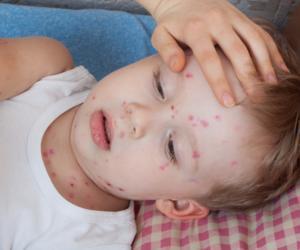
Chicken pox (chickenpox) is an extremely contagious disease caused by the chickenpox virus
While extremely painful, most patients recover within a few weeks. There is generally only a slight rash, which begins on the back and upper arms and later spreads throughout the body and manifests as tiny blisters.
In most cases of chickenpox outbreaks, the virus is spread from person to person through coughing or sneezing. However, if a person is infected with the varicella-zoster virus and lives in an area where there is close contact, they are more likely to catch the infection from other people. This is why you should avoid direct contact with an infected person or person. In addition, people who have multiple contact with other people are more likely to catch chickenpox.
If you experience chickenpox symptoms, they can include fever, headache, loss of appetite, malaise, hair loss, swollen lymph nodes, and vomiting. If these symptoms persist for at least two weeks, it is very likely that you have chickenpox. Although there is no cure for chickenpox, there are several ways to treat it.
There are several over-the-counter medications for chickenpox. These medicines consist of a cream and ointment, which are available in the form of drops or lotions. There are also oral medications such as Valtrex. The most common forms of treatment are creams and ointments, but there are also prescription medications for those who prefer stronger medications.
In the early stages of chicken pox outbreaks, these over the counter medications are usually all that is needed. However, these medications cannot treat the cause of the outbreak itself, so these methods may not be enough to completely eliminate the disease. If an individual continues to experience the recurrence of the chicken pox episodes, then additional treatments may be necessary.
The antibiotics that these medications work on are able to kill off the virus, but they do not remove the virus' root cause. This means that while a patient is taking the medications, there is always a possibility that the virus will come back. – this is because the medications will not eradicate the chicken pox virus but rather, temporarily suppress the virus so that it cannot cause an outbreak.

To permanently eliminate chicken pox, there are several herbal remedies that will destroy the viral infection
These herbal remedies are very similar to the medications that contain steroids that are used to treat various forms of cancer, but are safer and less expensive. Herbal treatments are much safer than using anti-inflammatory drugs, but will give the same effect.
Once you have suffered from a chicken pox outbreak, it is important to continue to take precautions to protect yourself and your family. Always make sure that anyone that you come into contact with has been tested for the disease. Also, keep in mind that there are some diseases that may never recur.
There are several things that can help you in the prevention of chicken pox outbreaks. For example, by washing your hands regularly you can minimize the amount of risk of being exposed to the virus. You can also make sure that you wash your clothes before you go to bed. By keeping your home clean and dry, you can reduce the chance that the virus gets into your blood stream and enters your body.
You should also make sure that your home is kept well ventilated to eliminate any possibilities of a chicken pox breakout. Keep the area where you sleep clean and dry. Wash your clothes before and after you use them and make sure that your bedding is clean and dry, especially if you suffer from allergies.
You should also avoid contact with others during a chicken pox outbreak, especially those that have a high chance of transmitting the disease. If possible, stay home and try to stay home when the virus is spreading throughout the city. Be especially cautious in day care centers, hospitals, and day care centers.
Although there is no single method that can prevent chicken pox outbreaks, there are many ways to treat them. As with any form of illness, staying healthy is the best way to fight it. Prevention is better than a cure.